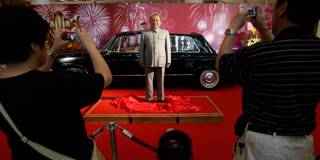What emerged intact from the massacre of defenseless students and other citizens in Beijing's Tiananmen Square was not communism, but a version of authoritarian capitalism on a grand scale. It is a model that appeals to autocrats all over the world, including in countries that succeeded in throwing off communist rule 30 years ago.
NEW YORK – China’s massive protest movement in the spring of 1989, centered in (but not confined to) Beijing’s Tiananmen Square, seems to have been the anti-Communist revolt that failed. As the brutal crackdown on and following June 3-4 played out, political freedom was being won in Central Europe – first in Poland and Hungary, and then, beginning that fall, in East Germany, Czechoslovakia, Bulgaria, and, albeit violently and rather undemocratically, Romania. Within the next two years, the Soviet Union, cracked open by Mikhail Gorbachev’s reforms, finally imploded.
These democratic revolutions followed the “People Power” rebellions a few years earlier in Northeast and Southeast Asia. Bliss it was to be alive in those days. Francis Fukuyama was not the only American who believed that liberal democracy had triumphed forever. There was no alternative to what was widely seen as a natural symbiosis between capitalism and open societies. One couldn’t exist without the other. Once the middle classes had their economic freedom, true democracy would surely follow.
Such was the sense of liberal post-Cold War triumph at the time that many Western countries, especially the United States, saw no reason any longer to contain the animal spirits of free enterprise with much government regulation. This was also the message brought to post-communist Europe by various evangelists of neoliberalism.

NEW YORK – China’s massive protest movement in the spring of 1989, centered in (but not confined to) Beijing’s Tiananmen Square, seems to have been the anti-Communist revolt that failed. As the brutal crackdown on and following June 3-4 played out, political freedom was being won in Central Europe – first in Poland and Hungary, and then, beginning that fall, in East Germany, Czechoslovakia, Bulgaria, and, albeit violently and rather undemocratically, Romania. Within the next two years, the Soviet Union, cracked open by Mikhail Gorbachev’s reforms, finally imploded.
These democratic revolutions followed the “People Power” rebellions a few years earlier in Northeast and Southeast Asia. Bliss it was to be alive in those days. Francis Fukuyama was not the only American who believed that liberal democracy had triumphed forever. There was no alternative to what was widely seen as a natural symbiosis between capitalism and open societies. One couldn’t exist without the other. Once the middle classes had their economic freedom, true democracy would surely follow.
Such was the sense of liberal post-Cold War triumph at the time that many Western countries, especially the United States, saw no reason any longer to contain the animal spirits of free enterprise with much government regulation. This was also the message brought to post-communist Europe by various evangelists of neoliberalism.